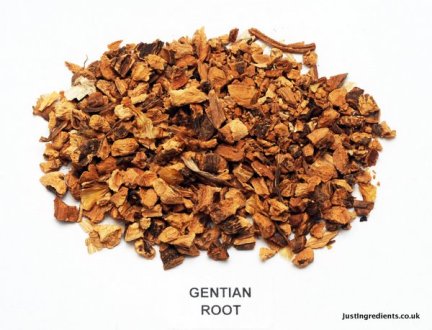
Gentian root usually is referred to by alternative medicine supporters and natural health practitioners as bitterwort, bitterroot or sometimes yellow gentian. Its scientific name is Gentiana lutea, or great yellow gentian. Used for centuries in Europe, gentian root is considered a highly effective treatment for various digestive tract conditions and illnesses. Gentian root is a natural, alternative treatment for liver support, gallbladder function and a wide variety of stomach maladies. Even when diluted more than 12,000 times, this herb still is the most bitter of all herbals; all other bitters are measured against it when determining the level of bitterness.
Most parts of the gentian plant can be used in herbal preparations, but the roots and stems are the most potent. It is a perennial herb that usually is found in the temperate regions of North and South America, Europe and parts of Asia. Yellow flowers and a fat, hollow stem are the hallmark of the plant; its fleshy root has a very aromatic fragrance. Quite sweet on initial taste, gentian rapidly becomes bitter tasting. The extreme bitter flavor provokes the salivary glands almost instantly, in turn causing levels of gastric juices to increase proportionately.

Normally, gentian root is used for conditions such as flatulence, heartburn, upset stomach and poor digestion. Homeopathic doctors have used gentian root to treat anorexia nervosa and to stimulate the appetite mechanism. The herb also encourages the production of saliva, as well as provoking a reflex in the nervus vagus that promotes bile production and encourages the flow of other gastric juices to aid in the digestive process. Other benefits include anti-inflammatory and fever reducing qualities. It also has a significant level of antioxidants, along with antibacterial properties.
Gentian root might cause a slight elevation in blood pressure and blood sugar if taken in excessive quantities. Persons with ulcers and extreme forms of heartburn and acid indigestion should avoid the use of the product. Women who are lactating or pregnant should avoid the herb, because the preparation does have some effect on the menstrual cycle and female organs.
Source: wiseGEEK
The products mentioned on this site have not been evaluated by the Food and Drug Administration, and are not intended to diagnose, treat, cure or prevent any disease. Please note that we cannot diagnose or prescribe or give medical advice to anyone.
thank you for sharing this. I think i might search some out this weekend at rainbow grocery.
Great! If you don’r find it, I’ll send you some from Dandelion Botanical Company or derliver it personally 🙂
Thank you for stopping by!
Wishing you health and happiness!
Nina